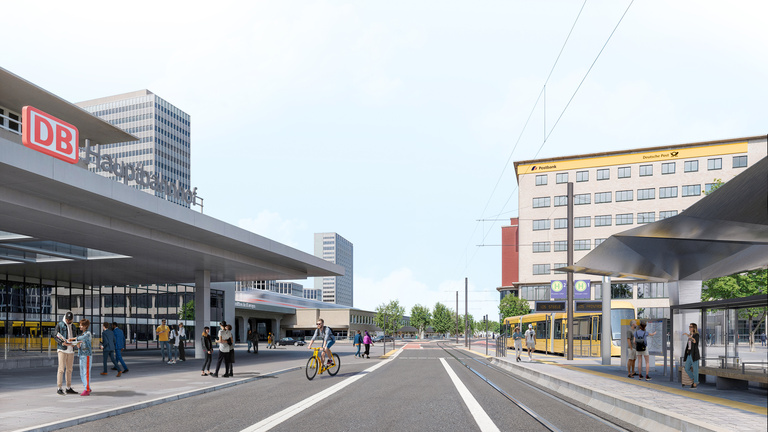Essen, Germany, September 24, 2025. After almost 50 years, the streetcar is returning to the cityscape of downtown Essen as the CITYBAHN. However, there is construction work to be done before the streetcar can hit the tracks. The third phase in the construction of the Bahnhofstangente started in July. It is one of three central segments of the project, which also includes Berthold-Beitz-Boulevard and the ESSEN 51 quarter. A state-of-the-art east-west connection is being built along a 5.5 kilometer stretch with eleven stops, providing a zero-emission link between the new ESSEN 51 quarter and the city center. The goal is to introduce a new timetable next year. Drees & Sommer, a company which specializes in real estate and infrastructure consulting, provides project steering services to the City of Essen and Ruhrbahn GmbH.
With more than half a million inhabitants, Essen is one of the largest cities in Germany’s Ruhr area as well as an important transport nodal point. The city is often heavily congested with commuter traffic and delivery vehicles converging on the centeri. The new track of the CITYBAHN will change all this, as it will enable commuters to travel from ESSEN 51 straight to the city center in only 8.5 minutes. The cost of the project, totaling in the region of 180 million euros, will mainly be borne by the federal and state governments.
“The CITYBAHN will significantly accelerate the transition to sustainable transport and its connection to Essen’s central station will stimulate urban development,” says Martin Harter, Director for Urban Planning and Building of the City of Essen. “It will also relieve the pressure on the existing network, especially the underground systems. Each streetcar will carry around 200 passengers. We estimate that this could reduce greenhouse gas emissions by up to 1,300 metric tons per year,“ adds Simone Raskob, Divisional Director for the Environment, Transport, and Sport of the City of Essen.
Central to the City’s Development
The CITYBAHN is more than just a mode of transport. It will make a significant contribution to the development of the city. At the heart of the ESSEN 51 quarter, right in front of the former Zeche Amalie colliery, there will be a shared space without segregation between the different types of road users. The aim of this design is not only to enhance the area but also to benefit the city’s climate. Hollestrasse, Haus-Berge-Strasse und Hachestrasse will have green tracks, and there will be a green corridor with 115 trees on Berthold-Beitz Boulevard. “Green transport ways not only make the cityscape more appealing, but also bind harmful substances, hold rainwater and cool the air through evaporation processes. There are also plans for underground infiltration trench systems, which can supply harvested rainwater to trees during longer dry periods,”explains Sebastian Brandenbusch, Project Manager at Ruhrbahn GmbH.
Complex Plans for a Future-Proof Transition to Sustainable Transport
The extension of the CITYBAHN is currently the largest city-center streetcar infrastructure construction project in the German federal state of North Rhine-Westphalia. However, not only the project volume is challenging. Markus Hauser, who heads the project at Drees & Sommer comments: “We are responsible for the collaboration of several project participants: planning firms, construction companies, authorities and the city administration must smoothly work together. We coordinate all parties involved in order to avoid any duplication of work. Regular progress controls and status reports keep all stakeholders updated. This allows for the best use of staffing resources.“
The project participants also responded effectively to challenges such as the difficult substrate in the third construction phase involving the redesign of Berthold-Beitz-Boulevard. ”The region is a former underground mining area, and related damage showed up in the substrate. Extensive work is currently being carried out to fill in cavities and stabilize the area for the construction of the transport infrastructure,” points out Markus Hauser.
First Segment of the New Track Ready by 2026
Work on the new CITYBAHN in Essen’s city center is progressing well. The first newly built or modernized stops around the central station will be ready to receive passengers by the summer of 2026. This means that the central part of the CITYBAHN, the Bahnhofstangente with the stops named Betriebshof Stadtmitte (city center depot), Hollestrasse, Essen Hbf (central station) and Hindenburgstrasse, will go into operation on schedule. Subsequently final construction works on Berthold-Beitz-Boulevard will start. Ruhrbahn GmbH and the City of Essen are planning to gradually complete works and enable operation. The project is expected to be concluded by 2028.
